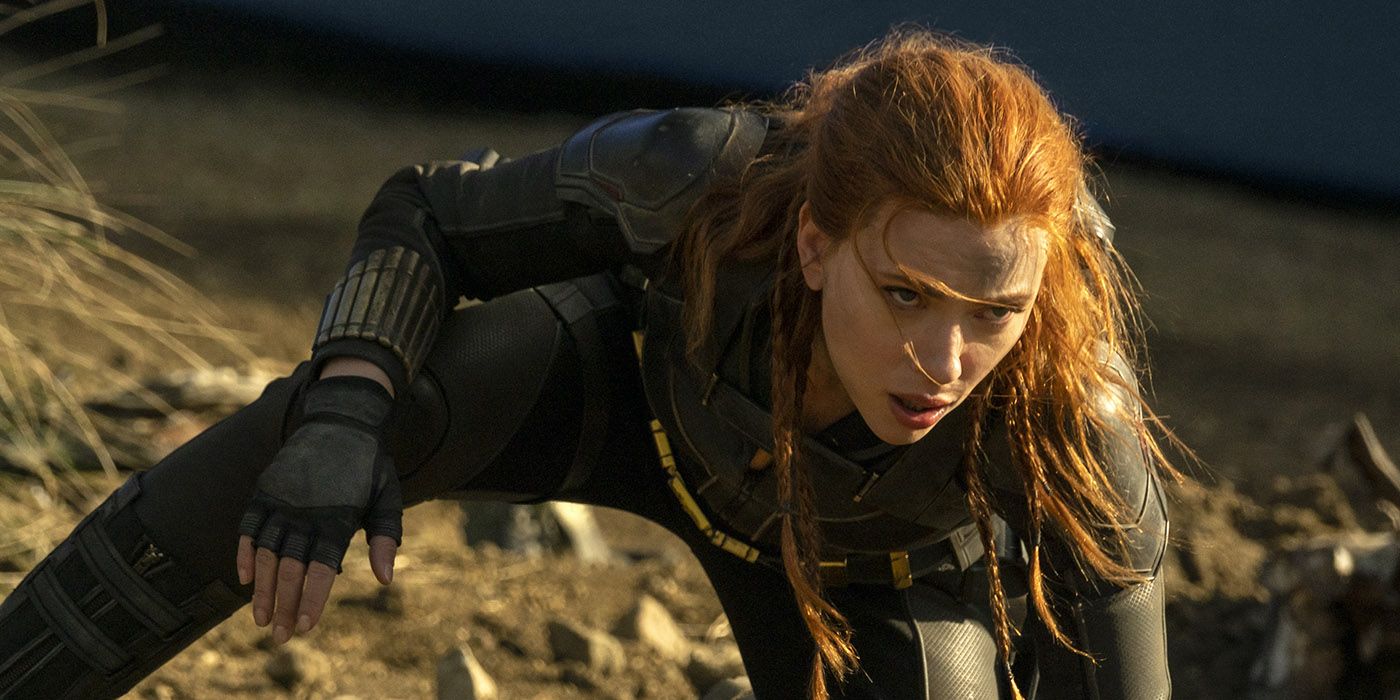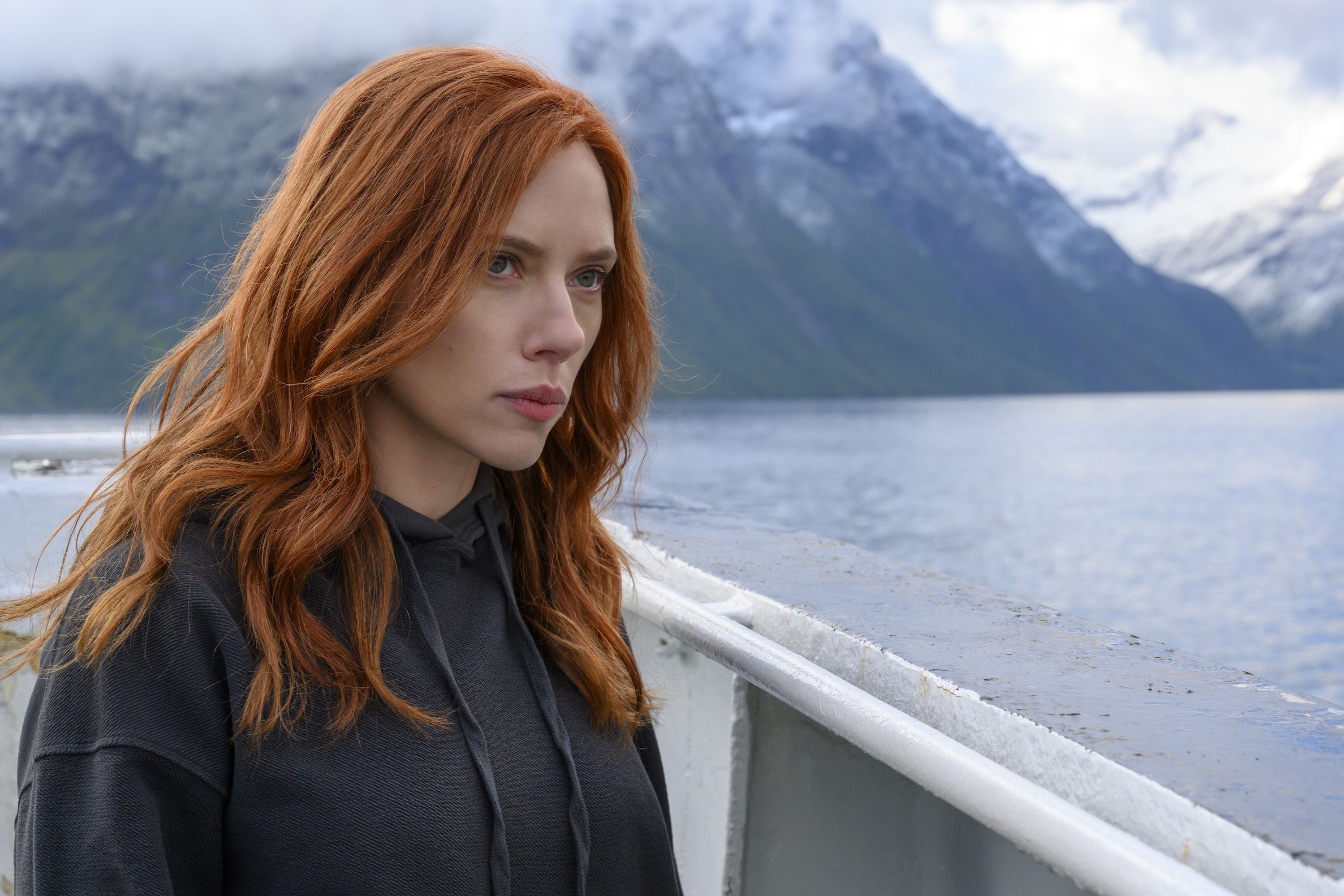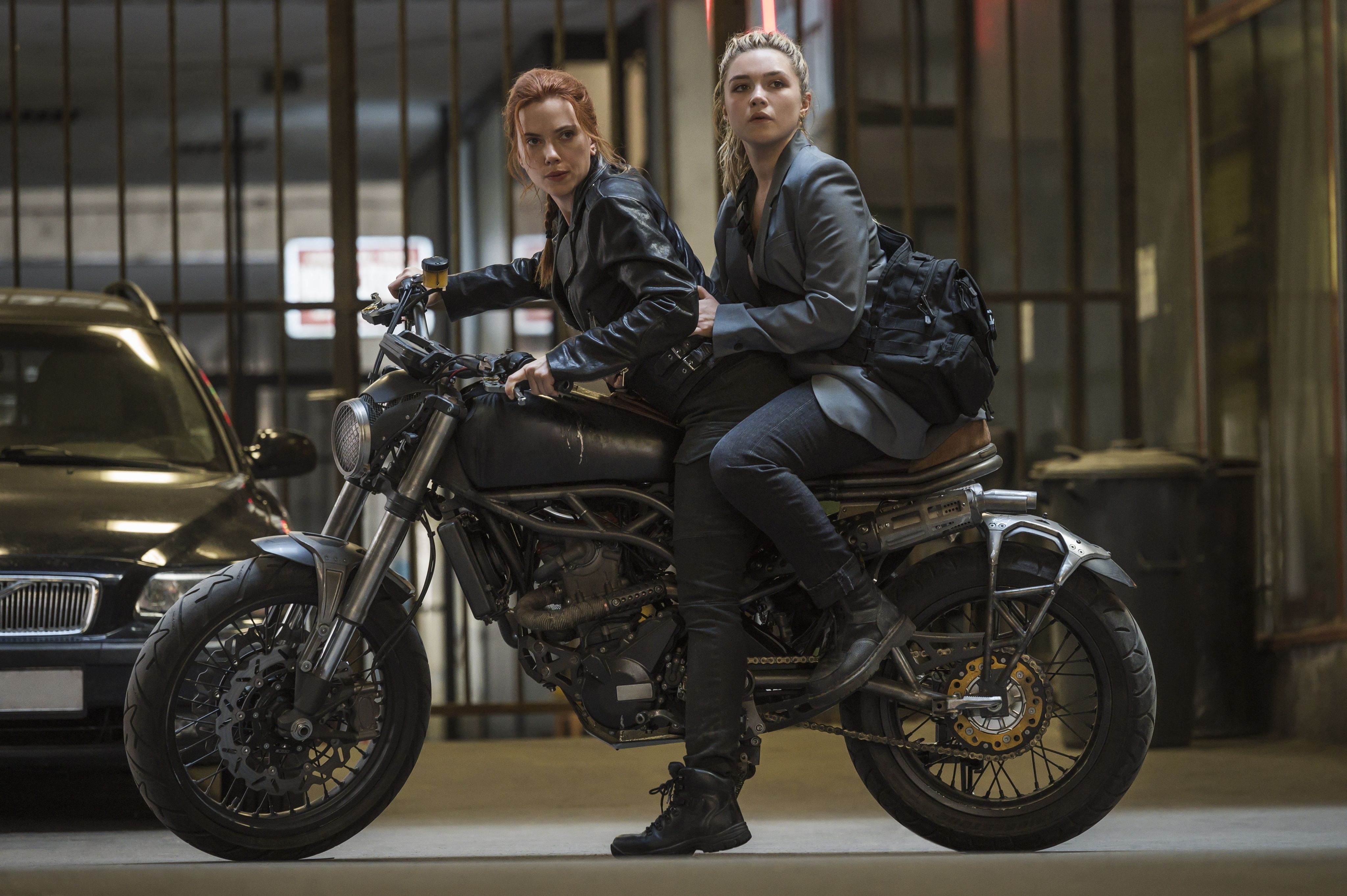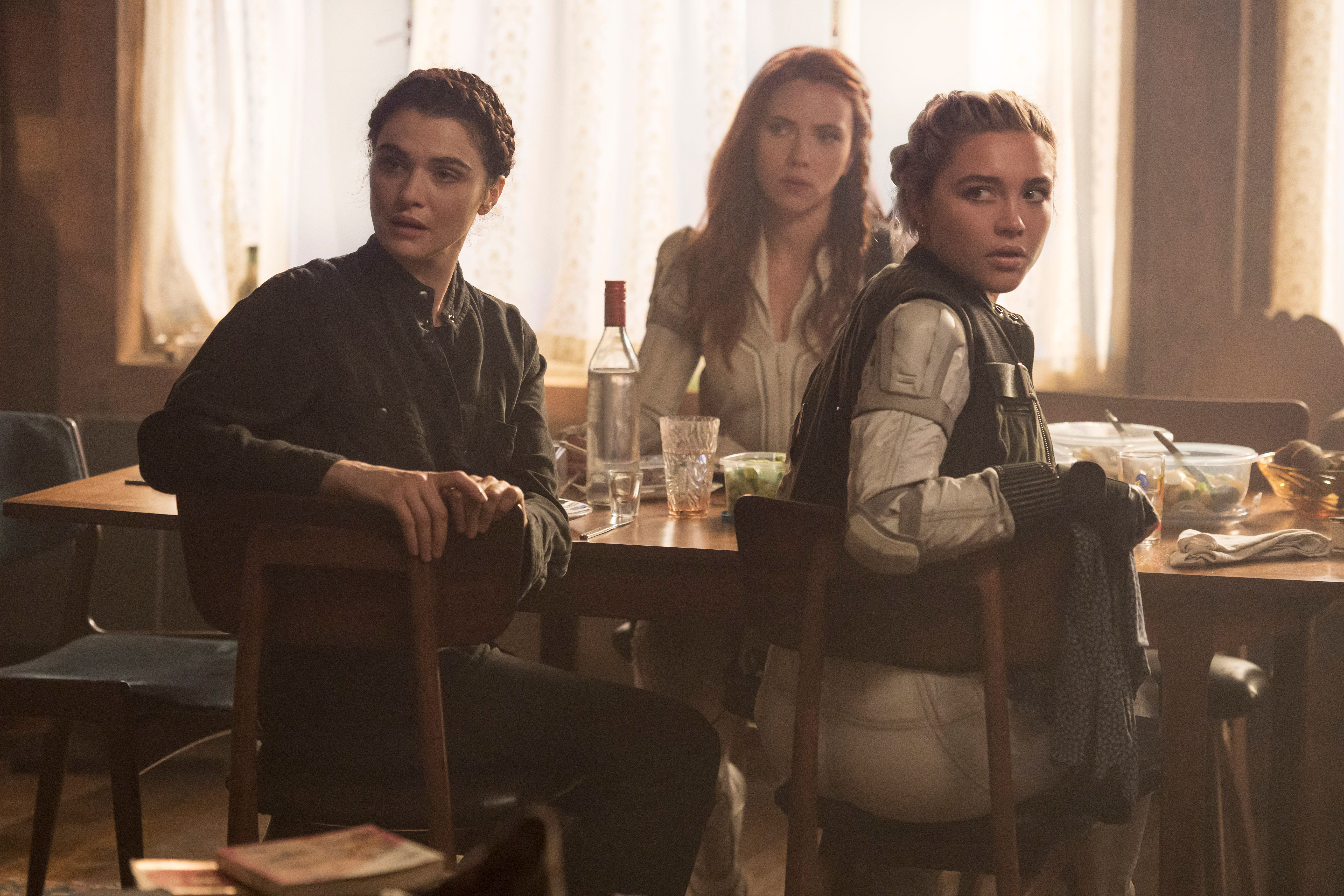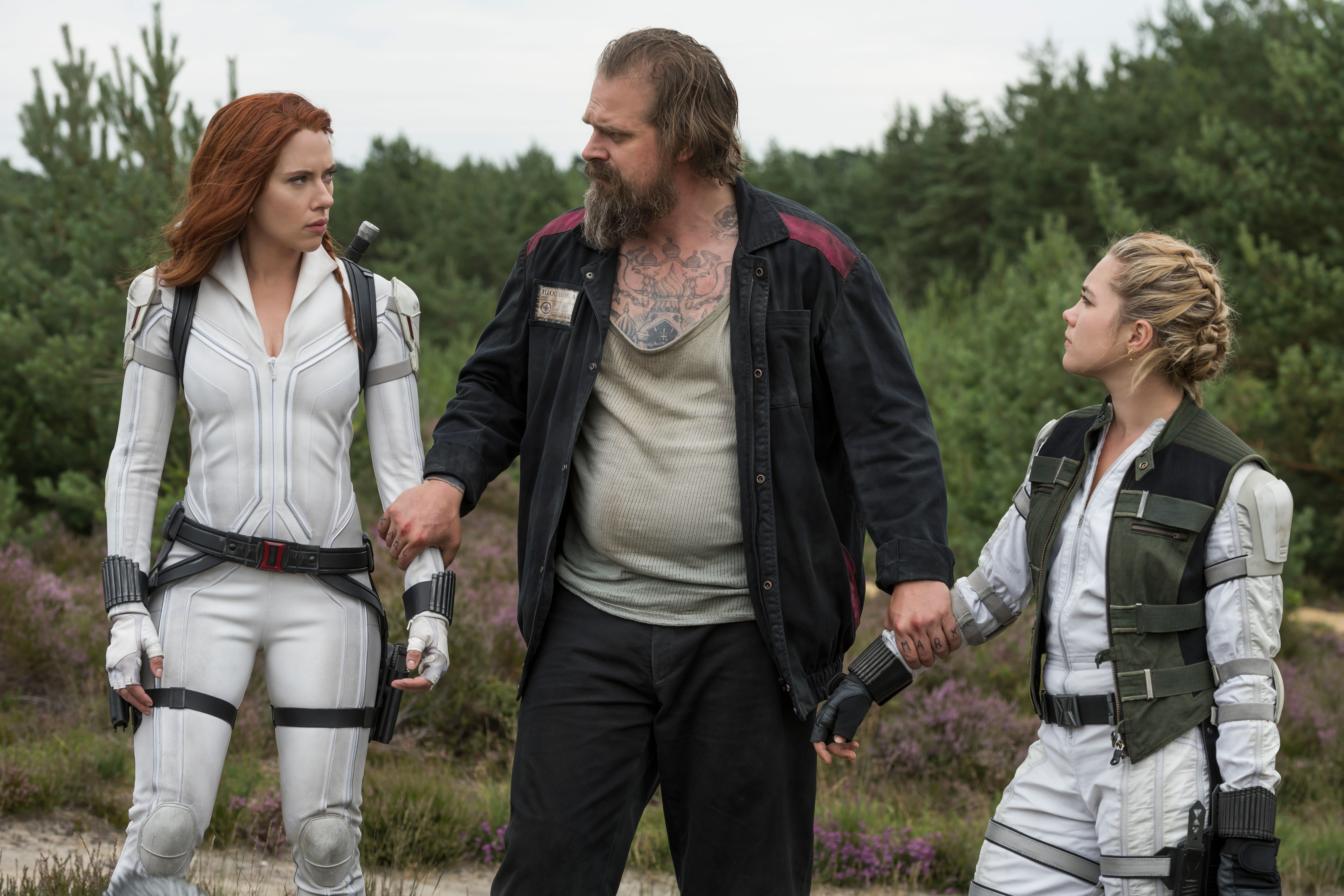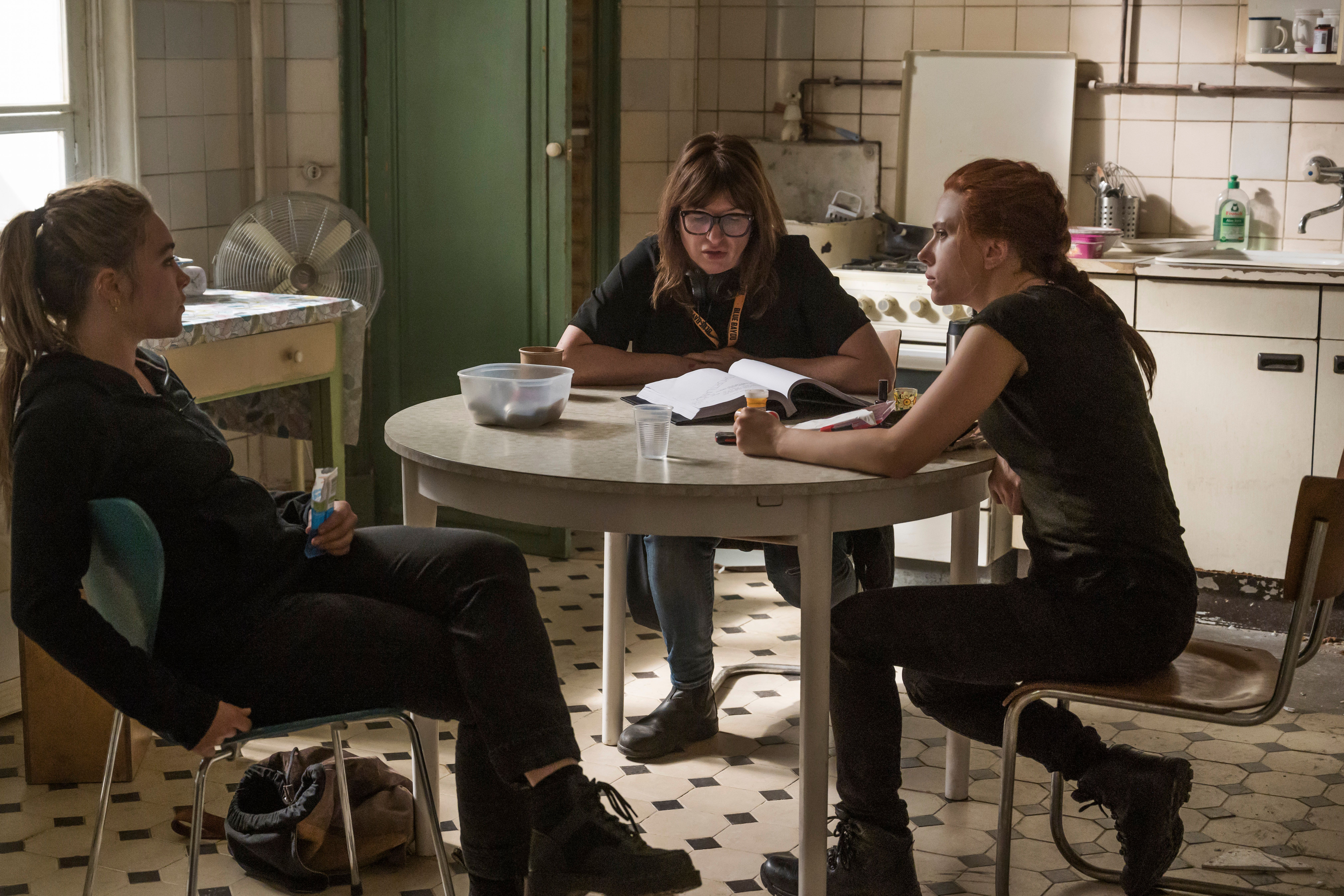From director Cate Shortland, Marvel Studios’ action thriller Black Widow highlights Natasha Romanoff (Scarlett Johansson), aka Black Widow, at a time when she must face the demons of her past and the relationships she left behind before she became an Avenger. While fans of the Marvel Cinematic Universe feel they’ve gotten to know Natasha over the years and previous films, the opportunity to get a glimpse of her backstory shows a whole new side of her world.
During a virtual press conference to promote the film, co-stars Johansson, Florence Pugh (“Yelena Belova”), Rachel Weisz (“Melina Vostokoff”) and David Harbour (“Alexei Shostakov,” aka “Red Guardian”), along with director Shortland and Marvel Studios’ president and chief creative officer Kevin Feige, talked about the film’s global adventure, diving deep into Natasha’s past, bonding over action scenes, the family dynamic, introducing new characters into the MCU, creating the opening credits, and the open possibility of exploring the past, present, and future of any of the MCU characters.
Question: Cate, this is truly a global adventure and it has tons of action in it, but also a lot of deep emotional content. How did you approach the film, to get that balance?
CATE SHORTLAND: From the beginning, when we spoke about the film, we knew that it had to speak to two things, which was Natasha as an individual, and then what had happened to her and who she was, at the beginning of the film, which was completely alone. I wanted it to be really fun. I thought it should be a fairground ride and really exhilarating. We wanted it to be raw and thought that those things would seamlessly mesh together. It was always putting her at the center of it, but making sure that we didn’t let the trauma of her past drag it down, and that we came up to answer it, and we often did that with humor.
Kevin, we all know that Natasha made the ultimate sacrifice in Avengers: Endgame. How does that figure into how you tell the story of this film, in Black Widow?
KEVIN FEIGE: We very specifically knew there was a large period of her life that we didn’t know about. Not just her childhood, but this period of time between Civil War and Infinity War. We felt that period was ripe to creatively focus on, to be able to discover more about her past and more about her present, and give a hint at the legacy in the future, all at the same time.
Why do you think fans had such a deeply rooted interest in taking this deeper dive into Natasha’s past?
FEIGE: Because Scarlett Johansson is an amazing performer, and with each and every appearance, you learned more, you saw more, and you wanted to know more. The fact that we finally have an entire feature dedicated to that was very exciting for all of us. And now that it’s coming out and people can see it, it’s even more exciting for all of us.
Scarlett, what aspects of Natasha’s personality do you feel you were able to showcase in this film, that didn’t come up previously in the MCU?
SCARLETT JOHANSSON: At the beginning of this film, Natasha is really alone for the first time. She’s always been a part of something, either by circumstance, or by not participating and being a victim, or by joining S.H.I.E.L.D. and then subsequently the Avengers. She’s always been a part of something that was part of a greater whole, and then suddenly she finds herself floating in this weird inbetween space and she’s off her game. She realizes that she’s got all of this possibility in front of her and it’s really suffocating. And then, she’s blindsided by this person who comes from her past, who is just on fire, is a liability, has got this crazy energy, is dangerous, is full of life, and isn’t needy, but needs her. She’s so thrown off her game in this, and it’s great to see her like that. We never get to see her like that. That was a fun place to start from. She’s just full of doubt, and that leaves a lot of openings for stuff to creep in.
Florence, how did you approach Yelena to make sure that we understand the connection to Natasha, but also that she’s unique and special in her own right?
FLORENCE PUGH: From the get-go, in the script, it was very obvious that they have this connection and they have this relationship. Ultimately, despite her skill set, she is that wonderfully annoying younger sister that says all the right things at all the wrong times. It wasn’t hard at all for me to get into that. Something that I really appreciated was that Cate was so welcoming of me to figure out how she thinks and how she moves and what she wears. For me, that was such a fun part of figuring out this character because she comes out of the Red Room and can really start life. She can buy her own clothes and she can buy a vest that has lots of pockets and that she’s really excited by. Cate really encouraged me to find the oddities in her and lean on that. Towards the end of the film, you can see that she’s flourishing and becoming her own being. Also, being welcomed into it with Scarlett being as giving as she was, I really found it such a wonderful creative space. I just had fun. That was the overall thing. It’s just two sisters having so much fun together, amongst all of the pain they’ve shared.
What was the first sequence that you filmed together and how did you get to know each other through that?
PUGH: The first sequence that we shot was the Budapest fight scene in the safe house. That was my first week of shooting, and that was Scarlett’s second week of shooting. Literally, on my first day, I was throwing Scarlett up against a wall and she was smashing my face in the sink. I just remember thinking that here was no greater way than to break the ice than really wrestling Scarlett Johansson to the floor and trying to choke each other. It was great that it was done. We got to know each other and were friends.
JOHANSSON: It was definitely an ice breaker. I’m very lucky because Florence is an athletic person. She has a background in dance. She nailed all of the choreography. She was right there with me and totally game to go at it, which was great. It’s such an emotional fight. It’s all driven by emotion. There’s no real end goal there. It’s just two people expressing their frustration and also that power struggle, and their genuine surprise and affection for one another. It’s like two lion cubs, just going at it. It was such a unique way to bond with another actor. It also felt like a very safe way to do it. There was no trepidation. We were just in the muck. It was unique, but it was good. It was good scheduling on our part.
PUGH: I also feel like, in terms of where our relationship went after, it was probably perfect timing. These two sisters haven’t seen each other in years and they don’t know how to be around each other. Maybe that added to it.
SHORTLAND: And there was a heatwave. We kept having to stop shooting because the set was like a microwave oven. It was great watching these two women fight and making it look effortless, and then they’d stop and we’d hose them down, dry them off, and put them back in.
Rachel, how meaningful is it to you, to be in a film that’s got this complexity of female characters like Melina?
RACHEL WEISZ: I love stories about women, directed by a women. I love playing opposite women. But I really loved playing opposite the Red Guardian, Alexei, as well. I don’t wanna leave him out. I like stories about people, but it was wonderful to tell a story with three complicated, strong women. On the page I just thought she was a really unusual character. I loved her relationship with her pigs. Shooting that family scene, where the family gets back together in Russia after 20 years, was just a completely delightful thing. We were upstaged by the pigs, most days. It was really unlike anything I’ve ever done. It felt incredibly intimate and incredibly emotional. I had to steel myself, most days, to stop laughing at David Harbour because he was improvising and he’s one of the most eccentric, original, funny people on this planet. It was really lovely. Also, what I liked about Melina was that she has absolutely no sense of humor, which made her quite funny sometimes. People are many, many, many things. What the writers got onto the page and what Cate directed was just highly complex people that are very contradictory. All three of us are elite Black Widows, but there’s a lot more to them than just that.
David, how did you find that fine line of with someone like Alexei, who is constantly humorous?
DAVID HARBOUR: The funny thing about him is that it hatches from the same egg, the pathos and the humor of this character. He is filled with grief and remorse about the choices that he’s made, emotionally, spiritually and nutritionally. The comedy itself comes out of the ego that is built to defend against the feelings of that remorse. In other words, he has to be so bombastic because he can’t stop and feel these things over the failures that he’s made. He e has to build around him, of a confabulatory, psychotic reality where he’s the hero, and that’s inherently silly and funny. Also, the family dynamics themselves are just so fun. There’s almost the traditional shot, which is the perfect image for this movie, of all of us around the table in these very specific positions, where we’re all in supersuits. You have this almost Norman Rockwell thing of dad coming in last to sit at the head of the table while the eldest child sits here, and mother and baby sit over here. I found us all falling into these traditional cliche roles, and then riffing off of that. That was really fun and satisfying as well.
Scarlett, you’ve worked with so many MCU actors for a long time now. What’s it like welcoming new people into the Marvel world?
JOHANSSON: It’s very exciting. I love our Marvel family. I know how special it is and how special the experience is, making these films. I’m just excited for other actors to come in and I hope that they feel similarly. It’s wonderful to see people come into something with excitement and be wide-eyed and get to experience the incredible world of Marvel and making these huge productions. We all have been part of big productions before, but because Marvel feels so familial, it’s just a very unique, warm, inviting place, and it’s a fun thing to share. It was exciting to see everybody experience that for the first time.
David, which other MCU hero would you like to see your character team up with?
HARBOUR: Oh, God, none of them. I consider myself so extraordinary and so above all of their mere pedestrian powers (laughs). I don’t know if it’s to team up with, but I really love the Falcon character. I love Anthony Mackie, just as an actor too. And now that he’s wearing the Cap suit and with the amount of complexity that Alexei has with Cap, in general, whoever wears the suit, he hates that guy and who he represents. I just think that dynamic would be really fun, to see those guys.
Rachel, how about you?
WEISZ: The Hulk.
PUGH: Oh, no, I was gonna say The Hulk. Can we share?
WEISZ: Yeah.
PUGH: Imagine if you could control him. You’d have like the ultimate weapon.
Kevin, what went into creating the opening credits of the film?
FEIGE: We needed to set the stage for what both of these women, and all of these women, had gone through in their past and exactly what Ray Winstone, the villain of our piece, had done and what made him so evil in his dealings. This idea came about, and it was later in production or even in additional photography, to showcase that moment that they were pulled apart. What happened after the plane took off and David’s character sent them back with Ray Winstone. It ended up being one of our rare opening title sequences that really helped set the tone and the backstory for Natasha’s character.
Cate, how did the process of creating a film that’s interwoven into this massive larger tapestry compare to working on previous films that you’ve done?
SHORTLAND: In some ways, it was really similar because when you’re on set, you forget the infrastructure because you’re so fixated on what [the cast] is doing and you try to just be in that moment. But you have to walk 20 minutes to get to that moment through 500 trucks and 400 people, and there are a lot of very big meetings with people, which I had to get used to. Kevin gave me advice, very early on, which helped me. I’m quite a shy person, so I like to talk to just a few people, but you have to get used to being in these big groups. What was beautiful about it was leaning on people and being open and trusting. When you come into Marvel, you think it’s gonna be like this big studio, but actually it was just really excited, decent people that wanted to make a good movie with me. That was the beautiful part. There’s so much collaboration and so much building on ideas. The Gulag started off as three guys in a yard and it ended up with a force of nature and 500 extras. I loved that. I loved the experience.
Scarlett, since production on Black Widow began after Avengers: Endgame, did knowing Natasha’s eventual demise play on your psyche and affect the way you approached the character in this film?
JOHANSSON: Yes, it did. It was important. We started talking about this film, as a more serious possibility, when we were doing. We shot Infinity War and then Endgame, back-to-back, and we already knew what the endgame was for Natasha. We wanted to make sure that was a choice that she made actively and that it felt like she had resolve then. Knowing that, we then had to work backwards, so that she could get to a place where that was possible. We knew that, in this film, she had to evolve into a place where she was moving forward in her life and had resolved the trauma from her past, and she felt like a different person moving forward. It was a very weird way of working, but maybe that’s always the case with a prequel. I’ve never done anything like this before. It was interesting to be working on something presently, that also played into what you would be doing in the future and that was reflective of the past. It was crazy.
Kevin, could this kind of look to the past apply to other MCU characters, or is this a particular case because Natasha is a particular character?
FEIGE: Well, certainly this film and this story is a particular case for Natasha. But the notion of exploring the past, present, and future of the MCU is certainly in the cards, for all of our characters. This particular story with this participate cast is very personal and very specific to Natasha.
Scarlett, what do you hope is the defining memory or character trait of Natasha Romanoff that sticks with Marvel fans?
JOHANSSON: She has a lot of integrity and she’s not afraid to admit when she’s wrong. She’s endearing, in that way. She’s curious about herself and curious about other people, and I think that makes her stand out. As superheroes go, I find her very endearing, but I’m partial.
Black Widow is in theaters and available to stream at Disney+ with Premier Access on July 9th.

